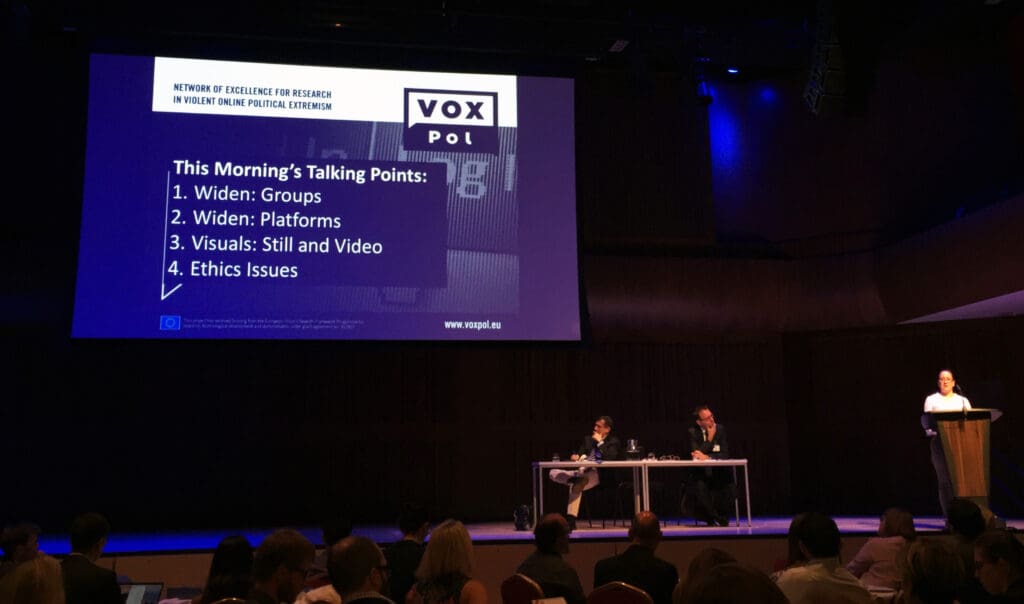Counternarratives
Blog
How Memes are Becoming the New Frontier of Information Warfare
April 1, 2020By Tom Ascott Everyone has seen a meme, whether they know it or not. They’re everywhere on Facebook, Twitter and Instagram. The most popular ones make it off the Internet and show up in newspapers, television shows or films. You’ve almost certainly seen Pepe the Frog, and if you haven’t seen the classic ‘Woman yelling ...
Blog
An Overview of Radical Right-focused Presentations at #TASMConf 2019
July 10, 2019By Pamela Ligouri Bunker and Robert J. Bunker The 2019 Terrorism and Social Media (TASM) Conference took place on 25 and 26 June 2019 at Swansea University Bay Campus, Wales, United Kingdom. The conference was organised by Swansea University’s Hillary Rodham Clinton School of Law and its Cyber Threats Research Centre (CYTREC), with the support ...
Blog
Fear, More Than Hate, Feeds Online Bigotry and Real-World Violence
March 13, 2019By Adam G. Klein When a U.S. senator asked Facebook CEO Mark Zuckerberg, “Can you define hate speech?” it was arguably the most important question that social networks face: how to identify extremism inside their communities. Hate crimes in the 21st century follow a familiar pattern in which an online tirade escalates into violent actions. ...
Blog
One-to-one Digital Interventions: How can Practitioners Directly Reach Young People Expressing Interest in Extremist Content Online?
January 30, 2019VOX-Pol contributed to the inaugural Radicalisation Awareness Network (RAN) Civil Society Empowerment Programme (CSEP) campaigns event in Brussels this week. We therefore thought we’d share some insights from a previous RAN event focused on online CVE. [Ed.] Introduction It is an essential part of extremist propaganda and outreach to not only communicate their messages to ...
Blog
Identifying Radical Content Online
February 14, 2018By Ryan Scrivens and Garth Davies Violent extremists and those who subscribe to radical beliefs have left their digital footprints online since the inception of the World Wide Web. Notable examples include Anders Breivik, the Norwegian far-right terrorist convicted of killing 77 people in 2011, who was a registered member of a white supremacy web forum and had ties ...
Blog
We Should Pay More Attention to the Role of Gender in Islamist Radicalization
November 1, 2017By Elizabeth Pearson and David Sutcliffe One of the key current UK security issues is how to deal with British citizens returning from participation in ISIS in Syria and Iraq. Most of the hundreds fighting with ISIS were men and youths. But, dozens of British women and girls also travelled to join Islamic State in Syria ...
Blog
Children are Being Used as Easy Weapons of Propaganda by Terrorist Organisations
July 19, 2017By Amy-Louise Watkin and Sean Looney To involve children in terrorism is an unthinkable prospect. And yet they have become not only targets of violence, but are being used to promote radicalised causes too. This is not just about European or American children being victims of attacks by the so-called Islamic State (IS). Young people who are ...
Blog
Reflections: Terrorism and Social Media Conference 2017
July 12, 2017By Samantha North On 27 and 28 June, in a sleepy Welsh city by the sea, a group of social media and terrorism researchers came together to discuss the latest challenges in the field. I learned a lot, met people doing admirable work and came away inspired with ideas to shape my own research in the ...
News
VOX-Pol participation in Terrorism & Social Media Conference
July 5, 2017The Terrorism and Social Media Conference (TASM) was held on 27 to 28 June in Swansea University. The event kicked off with a keynote speech by Prof. Bruce Hoffman from Georgetown University entitled “The Threat From ISIS and al Qaeda: Contextualising the Role of Social Media” in which he emphasised that social media has played a serious ...
News
VOX-Pol Participation in RAN C&N Meeting on Measuring the Impact of Online CVE Campaigns
February 17, 2017On 13-14 February, VOX-Pol Programme Manager, Lisa McInerney, participated in the EU’s Radicalisation Awareness Network’s (RAN) Communication and Narratives Working Group’s latest meeting in Brussels. The meeting focused on how to measure the impact of online counter or alternative narrative campaigns, with the aim of making it easier for campaigners to evaluate and measure impact ...









